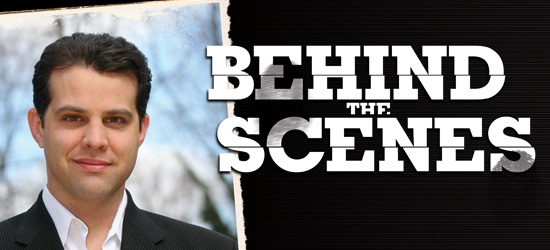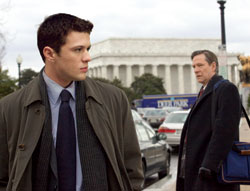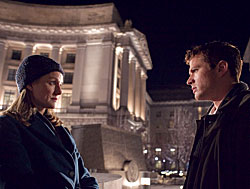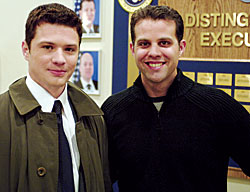
While attending night classes at GW Law School, Eric O’Neill, JD ’03, worked a grueling FBI undercover job and helped take down Robert Hanssen, the most damaging spy in U.S. history.
Thilo Rusche
Alumnus Eric O’Neill worked undercover to snag a super spy and inspired the movie Breach.
By Jaime Ciavarra
When he had a break from his day job as an FBI undercover operative, Eric O’Neill went to class.

|

Eric O’Neill was the inspiration behind the movie Breach, starring Ryan Phillippe as FBI undercover operative O’Neill and Chris Cooper as spy Robert Hanssen. The movie, which O’Neill pitched to Hollywood producers, was released in February.
Karen Ballard/ Universal Pictures
|
As others took copious notes on jargon-laden lectures, O’Neill, a night student at GW Law School, was logging the daily actions of the most damaging spy in U.S. history.
The photographic memory that allowed O’Neill to graduate with honors also helped the then-26-year-old take down Robert Hanssen, a notorious double agent who had been selling the country’s most sensitive secrets to Russia for 15 years.
During two cold winter months in early 2001, the classroom became a cozy escape where O’Neill could meticulously transcribe Hanssen’s actions and words, away from the windowless gray office he shared with the suspected spy.
“I think more often than not, I’d ignore the professor and just copy down everything [Hanssen] did for the day while my recollection was still fresh. I tried at one point to keep notes in the office, but I realized it was too dangerous, so I had to just start memorizing everything,” says O’Neill, JD ’03. “That eventually helped me out in law school. In later semesters, I found out my recall of what the professor said in any given lecture was pretty good.”
The high-pressure environment worked for O’Neill, who—after five years at the FBI as an undercover operative—went into the more stable world of government contract law as an attorney for DLA Piper in Washington, D.C.
Now 34, O’Neill is reliving his undercover days with the February movie release of Breach, a thriller starring Ryan Phillippe as O’Neill and Chris Cooper as Hanssen. The film, which O’Neill helped pitch to Hollywood before taking on a position as a special consultant, recounts his role in helping to snag Hanssen in the act of sharing U.S. secrets.
Computer whiz Hanssen, a devout Catholic and family man with a wife and six children, pleaded guilty to espionage and conspiracy in 2001. He had worked at the bureau for 25 years. Agents discovered that he had sold highly sensitive information to the Soviet and Russian governments since 1985, wrapping up documents in trash bags before hiding them in designated spots around Foxstone Park in Vienna, Va. Overall, Hanssen gave the Russians more than 6,000 pages of classified documents and revealed the identities of two double agents working for the United States, who were later executed in Moscow. The damage he did to the organization and country was described by then-FBI Director Louis J. Freeh as being “the most traitorous actions imaginable.”
For two months, O’Neill served as Hanssen’s assistant, waiting and watching for the next drop.
The Mission
It was a cold January Sunday when O’Neill’s boss made an unusual visit to his home, waking him up in the early hours only to insist they talk in his car. O’Neill thought his FBI career was over. Instead, he learned that he was being tapped to take on one of the most highly classified investigations in the country.

Washington, D.C., was the backdrop for the movie Breach, but GW Law School—where O’Neill was pursuing his JD at night—isn’t mentioned. In the film, Laura Linney plays special agent Kate Burroughs, a boss of FBI operative Eric O’Neill (Ryan Phillippe).
Karen Ballard/ Universal Pictures
|

|
As an FBI operative, O’Neill was used to undercover street operations, in which he followed suspects from an unmarked car, sticking to the shadows. He wasn’t trained for this kind of up-close-and-personal work, and he knew it. In the end, his inexperience turned out to be an advantage.
“Hanssen was so well trained in undercover work like this, that if I was using the typical undercover tool bag, he might have sniffed that out,” O’Neill says. “Since I had no tools, I began building them as I went along. That probably threw him off.”
The FBI handpicked O’Neill, he believes, for several reasons—he was young and newly married, knew a lot about technology, and was Catholic. O’Neill shared an adjoining office with Hanssen, watching his every move and regularly challenging him about his favorite topics, like computers and religion. O’Neill’s most integral move was snagging Hanssen’s Palm Pilot and downloading the information during a brief, intense window of time when his bosses took Hanssen to the shooting range. The information indicated a future drop was on the horizon, solidifying the FBI’s suspicions.
The one- to two-year mission turned out to take only two months when agents arrested Hanssen after making a drop at Foxstone Park near his home on Feb. 18, 2001.
With hundreds of agents involved in the case, O’Neill acknowledges that he played only a small role—but a significant one.
Like any good character actor, O’Neill immersed himself in the position and quickly learned to compartmentalize his mind for his daily tasks. In his subconscious, he says, he was furiously recording the day’s actions while he kept the front of his mind clean and open, remembering his place as Hanssen’s assistant.
“You need to be able to think and act in heartbeats, rather than seconds,” O’Neill says. “One pause and you get yourself in an uncomfortable situation.”
While he may have blended into the background at his FBI office, GW Law School professors remember O’Neill standing out in class. He earned his JD in 2003 with honors.
“As a general rule, he fell in the group of night students who were a little more interesting, a little more interested, and a little more engaged,” says Senior Associate Dean Steven Schooner, who was O’Neill’s professor for a spring 2003 government contracts class. Schooner acknowledges that going to law school is arduous and complex when pursuing a full-time job—let alone major undercover work.
That type of challenge “forces you to be organized, to prioritize, and to solve problems constantly,” Schooner adds. “Coasting along simply isn’t an option.”

|

O’Neill spent several days on the set of Breach, making sure props and mannerisms were authentic. Although O’Neill didn’t get to cast the parts, he says actor Ryan Phillippe nailed the tension in crucial scenes. “He makes me look good,” O’Neill jokes.
Michael Gibson/ Universal Pictures
|
From Hanssen to Hollywood
O’Neill, who earned his BA in psychology and political science from Auburn University, quit the FBI soon after the case ended, saying that the undercover world was ultimately too demanding on his personal life. At the insistence of his brother, David, an aspiring writer and actor living in Los Angeles, O’Neill decided to tell his story. When a book proposal wouldn’t materialize, O’Neill took his ideas to Hollywood, where he eventually negotiated a deal with Universal Pictures.
On the set, O’Neill spent days working with the props and wardrobe to get every detail right—from Hanssen’s guns, to the computers, to the cameras used to snap evidence in the spy’s car. Phillippe even used O’Neill’s worn briefcase from the time. To add authenticity, O’Neill shared some mannerisms with the actors, like how Hanssen clicked his pen and jingled his keys. Parts of the film are exaggerated or fictionalized, O’Neill admits. But the majority of the movie is an accurate portrayal, he says, with important underlying themes.
“I think one of the reasons it really resonates so well is that it’s very real to anyone’s personal life—themes like: Why don’t you betray? Why are you a good person? Why are some people moral and others not?” O’Neill says. “Everyone deals with that. Every attorney deals with that when he decides whether he’s going to pad his hours or not. There’s so much we could get away with if we choose to breach the moral line that divides good people from bad. It fascinates me that people choose again and again to be moral.”
O’Neill has his theories about why Hanssen breached that line—money, pride, a James Bond-like appeal—but he’d still like to ask him why he did it, and how he lived with himself. He has not seen Hanssen since before the arrest.
When he’s not working in his Washington, D.C., office, O’Neill is busy writing for three other outside projects, including two television scripts and a movie script. Ghosts, a TV series about a team of FBI surveillance operatives, has already been bought by the CW television network, O’Neill says. He hasn’t yet divulged the other projects’ plots, but he insists he’ll stay in Washington while he builds his law career. He has, of course, already proved that he can multitask.
His advice for busy law students bogged down by their full-time jobs?
“Read one of the cases and know it perfectly. And when
they ask for volunteers, raise your hand and make sure you get
it,” he says with a laugh. Even for an overachiever like O’Neill,“Getting all of the reading done is just impossible.”
Mission: Accomplished
Most people living in the Washington area remember when the Robert Hanssen case unfolded in February 2001 around the capital’s suburbs. Hanssen, a devout family man who worked as a double agent for 15 years, wrapped up secret documents and computer disks in trash bags before dropping them in designated spots, such as under a footbridge in Virginia’s Foxstone Park. Overall, the FBI says, Hanssen gave the Russians more than 6,000 pages of valuable material in exchange for cash and diamonds. Agents arrested Hanssen at his home in Vienna, Va., after they intercepted his last drop on Feb. 18, 2001. He pleaded guilty to espionage and conspiracy and is serving a life sentence.
|
|